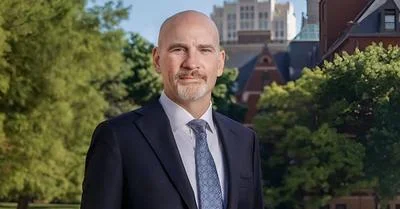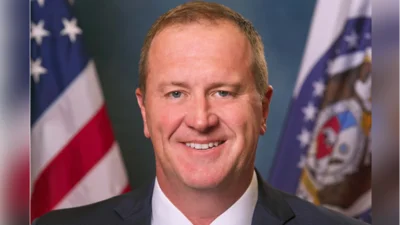Meeting | Gabrielle Henderson (Unsplash)
Meeting | Gabrielle Henderson (Unsplash)
Jeff Mazur, former executive director of LaunchCode, is joining Taylor Geospatial Institute (TGI) as the inaugural director of government and industry partnerships. In this role, Mazur will help the Saint Louis University-led Institute advance research and accelerate the region’s position as the global center of geospatial innovation and impact. Mazur begins his role on Jan. 17.
Mazur will be responsible for identifying and executing strategic government and industry partnerships that advance TGI’s research enterprise across its member institutions. He will also seek opportunities that lead to joint-funded research and development with government agencies and industry.“Jeff Mazur is an experienced leader who will engage with the TGI consortium to grow research, talent and services while building partnerships across the industry and region,” said Vasit Sagan, Ph.D., acting TGI director and associate professor of geospatial science at Saint Louis University. “He has a proven record of strategic leadership in technology and promoting great work in this area.”Mazur has spent years in technology education, government relations and communication, most recently at LaunchCode serving five years as executive director following two years as the Foundation’s vice president of partnerships. While at LaunchCode he worked to invest in relationships with community leaders and partners across sectors to strengthen collaborations. He spent five years as the executive director of the American Federation of State, County and Municipal Employees, Council 72. Mazur was a senior advisor for policy and communication in former Missouri Gov. Jay Nixon’s administration. The Taylor Geospatial Institute builds on St. Louis’ significant geospatial assets and is funded by a legacy investment by Andrew C. Taylor, Executive Chairman of Enterprise Holdings, Inc. and Founding Chair of Greater St. Louis, Inc. with supporting investments from each of the eight member institutions. The TGI consortium includes SLU, the Donald Danforth Plant Science Center, Harris-Stowe State University, University of Illinois Urbana-Champaign, Missouri University of Science & Technology, University of Missouri-Columbia, University of Missouri-St. Louis, and Washington University in St. Louis. Collectively, these institutions encompass more than 5,000 faculty and 100,000 students.“I am honored to join an institution whose people and partners are using geospatial data to solve some of the world’s most pressing challenges,” Mazur said. “By working to bring new companies and government agencies into collaboration with TGI I am excited to play a small role in realizing the Institute’s vast and compelling research vision.”TGI’s mission is to advance geospatial science through multi-institutional, interdisciplinary collaborations to create innovative, real-world solutions to societal grand challenges. It supports a collaborative research and training environment with a focus on:Core geospatial science & computation – leveraging an interdisciplinary network of knowledge, technology, and skills to make geospatial science more powerful and impactful.Food security – informing climate-smart farming practices while simultaneously increasing biodiversity and agricultural output.Geospatial health – measuring location and its influence on community health to improve healthcare systems and outcomes worldwide.National security – maintaining a leading edge over adversaries through innovation in cutting-edge technologies and a commitment to creating a highly-skilled geospatial workforce.Mazur earned his Juris Doctor from Georgetown University, a bachelor’s degree in political science from the University of Missouri, a certificate in senior executives in state and local government from Harvard Kennedy University and a certificate in business management from Washington University’s Olin School of Business.
Original source can be found here.





 Alerts Sign-up
Alerts Sign-up